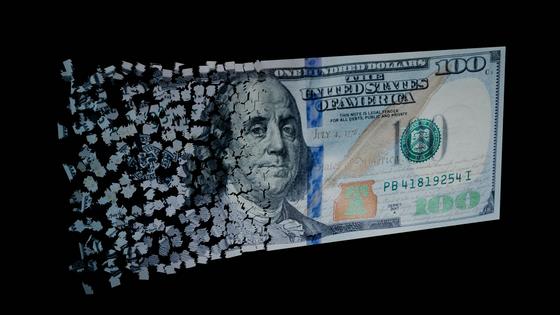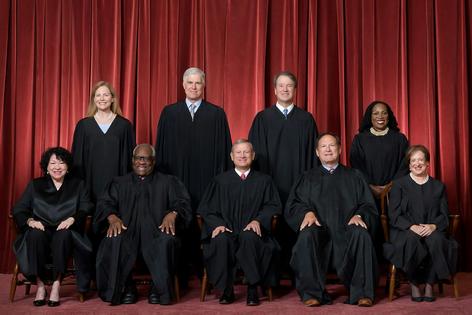What is ‘dark money’ political spending, and how does it affect US politics?
Published in Political News
Every campaign season brings renewed attention to the amount of money influencing American politics, and who is spending it, and for what purposes. In particular, people are concerned about what is called “dark money.” For instance, recent media coverage has pointed to escalating dark money spending on both the Democratic and Republican sides.
The term sounds scary and raises the specter of shadowy people manipulating the nation’s politics. As a researcher who studies the American democratic system, I think it’s worthwhile to unpack what dark money is, what concerns it raises and what might be done to address it.
When people talk about dark money, they’re usually referring to money spent on elections that comes from sources that cannot be identified.
Federal and state laws impose some limits on contributions and require some political contributions and expenditures to be publicly disclosed. Candidates for federal office, for example, must report their campaign donors to the Federal Election Commission. The FEC makes these reports available to the public.
Likewise, super PACs – groups permitted to spend unlimited amounts on independent electoral advocacy – must also report some information about donations, such as the identities of and amounts given by people who donate more than US$200 in a year.
But campaign finance disclosure laws have gaps.
Federal law, for example, allows certain entities – most notably nonprofits designated as “social welfare” organizations or trade associations under Sections 501(c)(4) and 501(c)(6) of the tax code – to raise and spend large sums on electoral advocacy without disclosing their donors.
Another dark money pathway involves making donations to super PACs through shell companies, which are companies set up for the purpose of hiding the financial activities of other people or groups – in this case, political contributions. Although super PACs are legally required to report who they received the contributions from, if the funds come from shell companies, the super PACs may not know and are not required to disclose where the money actually came from. That information remains hidden from public view.
A lack of donor transparency raises multiple concerns. Voters may have a harder time assessing the validity of political messages or discerning whether candidates may be beholden to certain interests. Regulators and watchdogs can have trouble detecting illegal activity, such as campaign spending by foreign nationals. And unscrupulous people and groups can spread misinformation or destructive rhetoric without being identified or held accountable.
While discussions of dark money usually focus on where it comes from, the term can also describe a lack of transparency about where it goes.
Under federal law, campaign committees must report their direct disbursements, such as payments to vendors or consultants. These vendors and consultants, however, sometimes function as pass-through entities that receive campaign funds and then purchase undisclosed goods and services. And any of these recipients can be set up as shell companies, making the flow of funds even more difficult to track.
For instance, Hillary Clinton’s 2016 campaign and the Democratic National Committee faced FEC complaints for failing to disclose indirect payments made through the campaign’s law firm to researchers who compiled a dossier on Donald Trump’s Russia ties. The Clinton campaign and the DNC paid a fine to settle the matter without conceding wrongdoing.
But enforcement can be difficult. In 2020, a watchdog group filed an FEC complaint alleging that Trump’s reelection campaign directed hundreds of millions of dollars to a pass-through entity in an improper effort to hide its expenditures – which included payments to top advisers and family members that, by law, would have otherwise been disclosed. The FEC dismissed the Trump complaint in 2022 when commissioners deadlocked 3-3 on whether to pursue it.
As with a lack of donor disclosure, a lack of expenditure disclosure can deprive voters and regulators of valuable information. Lack of transparency can also invite questionable campaign practices, such as using donated funds in ways that enrich candidates, campaign staff or their associates.
Proponents of greater campaign finance transparency have had little success pressing federal lawmakers and regulators to address dark money.
Since 2010, congressional Democrats have been introducing legislation known as the DISCLOSE Act. Among other requirements, it would make dark money groups reveal major donors and restrict the use of shell companies to conceal donors’ identities. While versions of the bill have passed the House, they have repeatedly stalled in the Senate. Opponents maintain that these measures would infringe people’s privacy rights and chill constitutionally protected speech.
Advocates have also made minimal headway persuading Congress or federal agencies to adopt new disclosure regulations or tighten enforcement.
The FEC, which has an even partisan split among its six commissioners, has often been unable to get a majority to agree to take action. And the FEC’s most notable recent decisions have been to loosen, rather than tighten, campaign finance rules. Congress has barred the Securities and Exchange Commission from establishing new political spending disclosure rules for public companies, although some companies self-report more than the law requires.
Dark money is also an issue in state and local elections. The strength of state and local transparency laws varies. Because these elections typically receive less attention and scrutiny than federal elections, money sometimes flows even more opaquely.
Unlike the federal government, a number of states and localities have bolstered their disclosure rules in recent years. Arizona, California, Colorado, New Jersey and Washington, for example, have passed new laws requiring more donor information, including about the original sources of funds that are transferred between multiple groups before being spent on electioneering.
Meanwhile, states such as Iowa, Massachusetts and Texas have adopted laws requiring campaigns to provide details about how consultants and vendors spend the campaign’s funds.
Even in these states, disclosure gaps remain. The reality is that efforts to improve transparency can seem like a game of whack-a-mole: Each new round of regulations tends to generate new workarounds. But the experiences in these states and elsewhere may offer models and lessons for other jurisdictions.
Beyond the political challenge of getting stronger transparency regulations adopted, proponents of such measures also face potential constitutional challenges by opponents of disclosure.
In multiple cases, including the 2010 Citizens United v. FEC ruling, the U.S. Supreme Court has rejected First Amendment claims brought by political spenders who wished to conceal their identities. In that case, the court observed that transparency helps the electorate “make informed decisions and give proper weight to different speakers and messages.”
However, the Supreme Court has also recognized a right to engage in anonymous political speech. And in recent years, the court’s conservative supermajority has become somewhat more skeptical of disclosure rules, including in a 2021 case, Americans for Prosperity Foundation v. Bonta, which overturned a state law requiring charities to identify major donors. In her dissent, Justice Sonia Sotomayor warned that the court’s argument could be applied to campaign finance disclosure regulations.
Therefore, even if public momentum builds for stronger transparency regulations, the Supreme Court could stand as an obstacle to such reforms.
This article is republished from The Conversation, a nonprofit, independent news organization bringing you facts and trustworthy analysis to help you make sense of our complex world. It was written by: Emily Lau, University of Wisconsin-Madison
Read more:
Yes, Trump’s PACs really can pay his legal fees
This Supreme Court has redefined the meaning of corruption
Election 2020 sees record billion in campaign spending, mostly from a handful of super-rich donors
Emily Lau does not work for, consult, own shares in or receive funding from any company or organization that would benefit from this article, and has disclosed no relevant affiliations beyond their academic appointment.


































































Comments